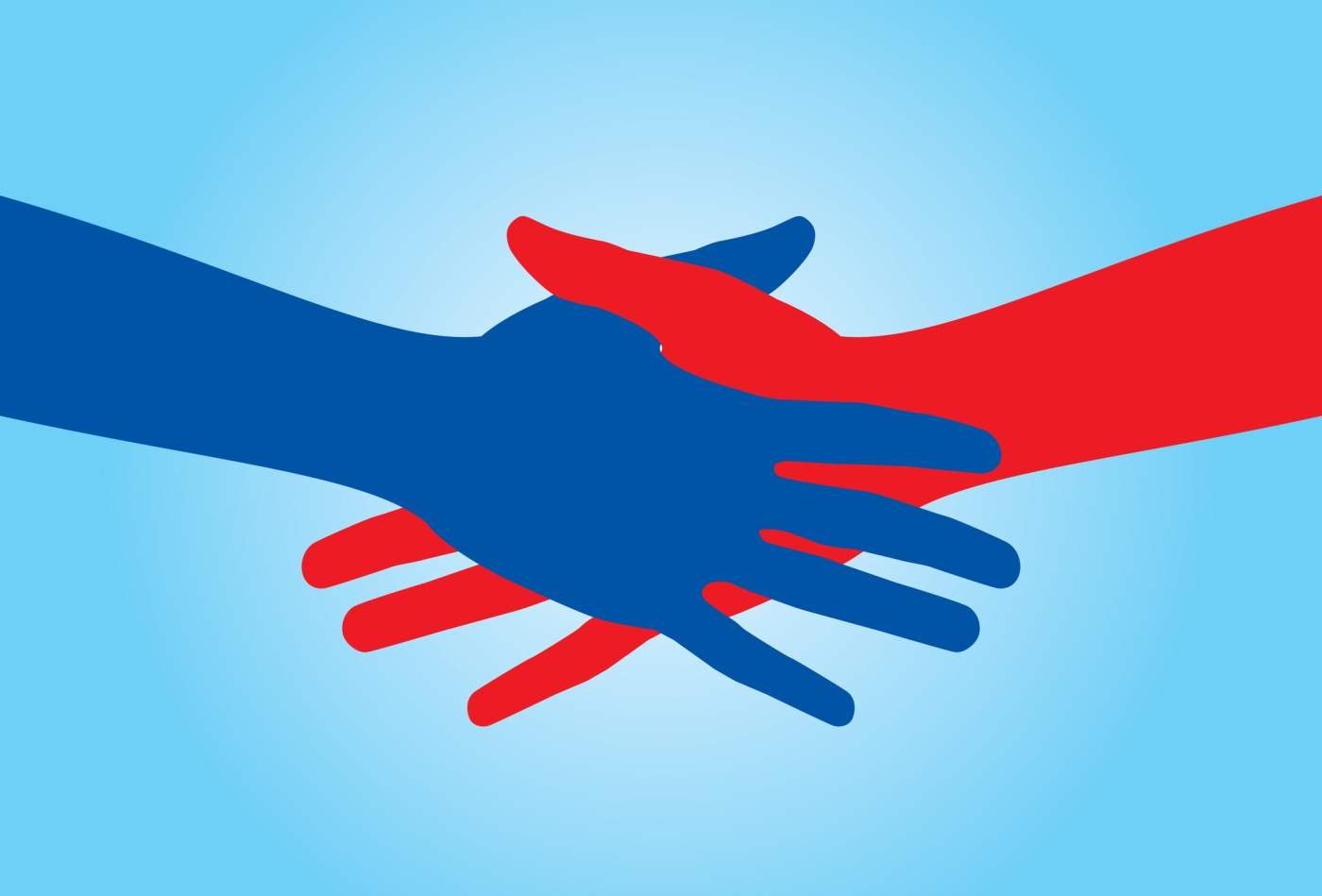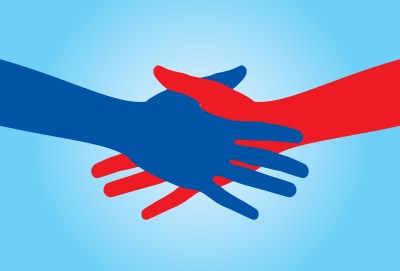GETTYSBURG, Pennsylvania—Countless organizations claim to be bridging America’s partisan divide, but how many of them have featured a banjo-toting hip-hop group in their efforts?
That was just one of several unconventional aspects of the recent national convention of Braver Angels, a nonprofit founded after the 2016 election to help Americans better understand one another and find “common ground where it exists.”
But before the banjos started up, Bill Doherty sat in a barber chair pretending to get his hair cut by Lance Walker, who had brought the chair from his barbershop in a nearby town. As Doherty expressed skepticism about the possibility of a generating a larger movement toward depolarization, more and more patrons filled the waiting room and joined the banter, with spiels to counter his objections interspersed between off-the-cuff jokes and amateur rap lyrics. By the time Gangstagrass took the stage with their fiddles and banjos, the crowd was fired up.
“If you’re part of anything as small as a barber shop to a big national organization, from a Republican Party to a Democratic Party … be part of this movement,” Braver Angels co-founder David Lapp urged the crowd. “It’s a festival—this is E Pluribus Unum.”
Unbeholden to any particular policy agenda and brimming with the energy of what Alexis de Tocqueville once called the “art of association,” the volunteer-driven nonprofit has grown considerably over its six-year lifespan, reaching tens of thousands of participants with thousands of events both in-person and online, including a variety of group and “one-to-one” workshops, parliamentary-style debates, and town halls. But as it seeks to spark a broader movement, the organization continues to face challenges related to selection bias and scale that could limit the reach of its call for civic renewal.
Braver Angels was founded by three men who knew each other through their work on marriage and family issues. After the 2016 election, David Blankenhorn noticed that his New York City neighbors were despondent over Donald Trump’s victory. Meanwhile, in South Lebanon, Ohio, Lapp observed the opposite mood prevailing. They recruited 10 Trump voters and 11 Clinton voters in the blue-collar town to participate in a structured weekend conversation, with Doherty designing and leading the proceedings.
Since that initial “red-blue workshop,” the nonprofit has continued to focus on interpersonal relationships and political culture, helping “reds” and “blues” see one another as neighbors rather than enemies. But that doesn’t mean trying to make them agree on a particular political agenda.
“It’s not about changing how people see the issues, it’s about changing how they see each other,” says Mónica Guzmán, a former journalist who now works for Braver Angels full time and credits the group’s programming with helping her and her Trump-supporting parents better understand each other. (She and her father sang a duet they wrote, “I Never Thought of It That Way,” at one of the convention’s sessions.)
The national organization has only a handful of full-time staff, while the bulk of the work is carried out by unpaid volunteers throughout the country—many of whom have sought to tailor the basic principles of the “Braver Angels Way” to their local circumstances, giving rise to the variety of “experiences” the group now offers, such as workshops for faith communities as well as the parliamentary-style debates that have been particularly attractive to college students and reds. Doherty and debates director April Lawson oversee the development of new programs, which are field-tested before being rolled out more widely by trained moderators.
“I’ve never seen so much spaghetti thrown at so many walls,” Jonathan Rauch, a founding board member, tells The Dispatch. “Some of it is sticking.”
One common thread in all of the group’s programming is that people should speak “freely and fully, without fear”—which can lead to contentiousness and discomfort. When Hawk Newsome, a Black Lives Matter activist from New York, entered Walker’s semi-fictionalized barbershop, for instance, he broke the fourth wall to engage with the crowd.
“Yesterday, I heard snickering at the conversation,” he said about the idea of reparations for black people. “You have no idea how offensive that was.”
At a breakout session on faith communities led by a conservative Southern Baptist and a progressive Episcopalian, one questioner accused the Episcopal Church of being “at war with white men,” while another suggested that the Southern Baptist Convention is aligned with “Christofascism.”
“If we were all completely comfortable with everything we heard here, it probably would have been a waste of our time,” Wilk Wilkinson, the red co-chair of the proceedings, told the crowd Saturday.
The crowd at the convention included disproportionate numbers of retirees and college students—the kinds of people with the leisure, resources, and disposition to show up to civic renewal events on a weekday. While the more than 600 delegates were balanced—40 percent red, 40 percent blue, 20 percent independent—by the design of the application process, that’s not always the case at the level of event participants or dues-paying members. According to a 2021 annual report, 54 percent of event participants identified as Democrats while only 15 percent identified as Republicans.
That lack of representativeness is far from ideal—but Braver Angels has been actively trying to mitigate it. In contrast to many organizations seeking common ground, the group insists on red-blue balance across all levels of leadership: Even the smallest local “alliance” must have both a red and a blue co-chair.
“When conservatives come to a lot of these kinds of bridge-building events, they can feel out of place, and it can feel like a blue enterprise really quickly,” Lapp, a red, tells The Dispatch. “We feel that it’s really important to say that this movement has to reflect America.”
The group hasn’t figured out exactly how to do that yet. But the diversity of voices across lines of age, race, class, and political belief present in Walker’s barbershop—including a black North Carolina GOP county chair, a son of immigrants and recent UC-Berkeley grad, and a former field secretary for Martin Luther King’s Southern Christian Leadership Conference—demonstrates a keen awareness of the self-selection problem.
Ideology aside, the people who show up to Braver Angels events are likely to be feeling the pressure of polarization in their interpersonal relationships. (That may be one reason that black Republicans and rural Democrats are especially attracted to Braver Angels’ work, Lapp says.) But with geographic sorting and a decline in religious and civic involvement continuing apace, the number of people who regularly interact with friends, family, and neighbors with different political leanings is dwindling. Braver Angels may help a few thousand people feel less hostile to one another—but in a country of 330 million, is it actually making a difference in our politics?
The straightforward answer is no. The first page of the convention program declared as much in large red font. “One organization can’t change the country,” it said. “A movement can.”
Braver Network, a new project Lapp is leading, hopes to encourage that movement by bringing together institutions interested in civic renewal, even if that isn’t their primary mission. Lance Walker’s actual barbershop in Chambersburg, Pennsylvania is one such institution. So is the Republican Party of Durham County, North Carolina.
Lapp hopes the network “takes on a life of its own.” Groups that endorse candidates or policies have a role to play, and they are welcome to join the network. But Braver Angels won’t be championing proposed fixes like ranked choice voting or proportional representation, even though plenty of their members might support them.
“To the extent that Braver Angels is inspiring structural reforms, I think it will usually be as a happy byproduct of individuals and groups coming together,” Lapp says.
That kind of cultural depolarization effort may be somewhat vague. But the Braver Angels delegates invariably agree that it’s important—and whatever it is, it takes time and effort. “This is not a fast food thing,” one of them said.






Please note that we at The Dispatch hold ourselves, our work, and our commenters to a higher standard than other places on the internet. We welcome comments that foster genuine debate or discussion—including comments critical of us or our work—but responses that include ad hominem attacks on fellow Dispatch members or are intended to stoke fear and anger may be moderated.
With your membership, you only have the ability to comment on The Morning Dispatch articles. Consider upgrading to join the conversation everywhere.